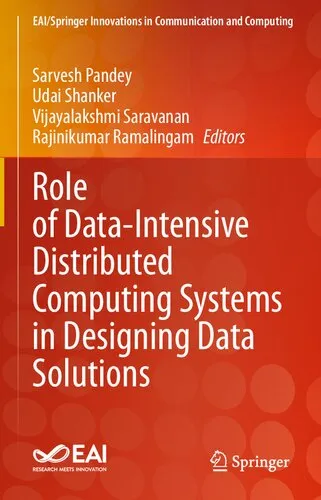Principles of Distributed Systems: 11th International Conference, OPODIS 2007, Guadeloupe, French West Indies, December 17-20, 2007. Proceedings
4.0
Reviews from our users

You Can Ask your questions from this book's AI after Login
Each download or ask from book AI costs 2 points. To earn more free points, please visit the Points Guide Page and complete some valuable actions.Related Refrences:
Introduction to "Principles of Distributed Systems: 11th International Conference, OPODIS 2007"
This book presents the proceedings of the 11th International Conference on Principles of Distributed Systems (OPODIS 2007), held in Guadeloupe, French West Indies, from December 17-20, 2007. As a leading event in the field, OPODIS has been a platform for promoting groundbreaking research and innovative ideas in distributed systems and distributed computing. The 2007 edition of the conference brought together a diverse and dynamic assembly of researchers, scholars, and practitioners, offering a rigorous collection of studies, discussions, and experimental results aimed at addressing the challenges of distributed systems in an ever-evolving technological landscape.
A Detailed Summary of the Book
The proceedings encapsulate the depth and breadth of the research presented during OPODIS 2007. Focus areas include distributed algorithms, fault tolerance, synchronization, network optimization, and emerging technologies for distributed architectures. The volume is meticulously organized, showcasing contributions that refine existing paradigms and introduce new methodologies for solving complex problems in distributed systems.
Each paper encapsulates rigorous theoretical exploration, practical experimentation, or real-world applications. Theoretical contributions delve into topics like Byzantine fault-tolerant systems, self-stabilizing algorithms, and dynamic networks, while practical innovations address efficiency in distributed computations and scalability issues. Furthermore, particular emphasis is placed on enhancing performance and resilience in distributed environments, which are vital for applications spanning cloud computing, large-scale data processing, and real-time systems.
By capturing a variety of high-quality contributions, the book fosters dialogue across academic and industry boundaries. It serves as an invaluable resource for scholars looking to understand contemporary advancements in distributed systems and for practitioners aiming to implement these developments in real-world scenarios.
Key Takeaways
- A comprehensive exploration of distributed algorithms that ensure system performance, fault tolerance, and synchronization in scenarios with multiple concurrent processes.
- Insightful research into the challenges of complex networks, particularly relating to optimization for scalability, efficiency, and resiliency.
- Real-world applications of distributed systems research, including advancements in cloud computing, peer-to-peer networks, and critical system architecture.
- Theoretical breakthroughs in areas like game theory for system modeling, dynamic graphs, and self-organizing networks for next-generation distributed systems.
Famous Quotes from the Book
“Distributed systems are inherently systems of collaboration — and their success lies in balancing autonomy and coordination for achieving optimal outcomes.”
“Fault tolerance isn’t optional. It is the cornerstone of reliability in any distributed architecture, from small-scale systems to globally distributed platforms.”
Why This Book Matters
The "Principles of Distributed Systems" series is vital for anyone interested in understanding or contributing to distributed computing. The 11th installment continues this tradition by shedding light on significant research breakthroughs and fostering forward-thinking discussion. In today's world, where distributed systems form the backbone of many critical applications, from fintech to healthcare systems and beyond, the insights in this book pave the way for innovation and resilience in tackling real-world challenges.
Additionally, the book maintains its relevance not only to scholars and academics but also to industry professionals who must deal with complex multi-node architectures and securely manage large-scale systems that span geographical boundaries. With its mixture of theoretical depth and practical relevance, it addresses key questions in distributed systems' reliability, scalability, and efficiency.
By offering readers the chance to explore the state-of-the-art developments presented during OPODIS 2007, this book equips them with the knowledge and tools to drive forward research and explore new horizons in the ever-expanding domain of distributed systems.
Free Direct Download
You Can Download this book after Login
Accessing books through legal platforms and public libraries not only supports the rights of authors and publishers but also contributes to the sustainability of reading culture. Before downloading, please take a moment to consider these options.
Find this book on other platforms:
WorldCat helps you find books in libraries worldwide.
See ratings, reviews, and discussions on Goodreads.
Find and buy rare or used books on AbeBooks.
1170
بازدید4.0
امتیاز50
نظر98%
رضایتReviews:
4.0
Based on 0 users review
"کیفیت چاپ عالی بود، خیلی راضیام"
Questions & Answers
Ask questions about this book or help others by answering
No questions yet. Be the first to ask!



